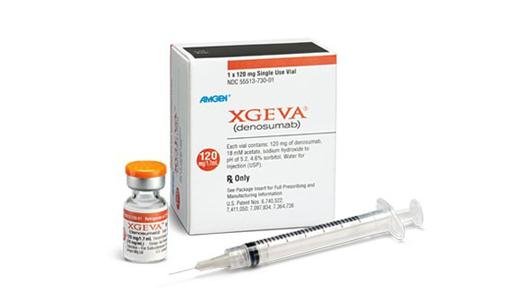Xgeva Dosage
Generic name: DENOSUMAB 120mg in 1.7mL
Dosage form: injection
Drug class: Miscellaneous bone resorption inhibitors
Medically reviewed by Drugs.com. Last updated on May 30, 2025.
Important Administration Instructions
Xgeva should be administered by a healthcare provider.
Xgeva is intended for subcutaneous route only and should not be administered intravenously, intramuscularly, or intradermally.
Multiple Myeloma and Bone Metastasis from Solid Tumors
The recommended dose of Xgeva is 120 mg administered as a subcutaneous injection every 4 weeks in the upper arm, upper thigh, or abdomen.
Administer calcium and vitamin D as necessary to treat or prevent hypocalcemia.
Giant Cell Tumor of Bone
The recommended dose of Xgeva is 120 mg administered every 4 weeks with additional 120 mg doses on Days 8 and 15 of the first month of therapy. Administer subcutaneously in the upper arm, upper thigh, or abdomen.
Administer calcium and vitamin D as necessary to treat or prevent hypocalcemia.
Hypercalcemia of Malignancy
The recommended dose of Xgeva is 120 mg administered every 4 weeks with additional 120 mg doses on Days 8 and 15 of the first month of therapy. Administer subcutaneously in the upper arm, upper thigh, or abdomen.
Preparation and Administration
Parenteral drug products should be inspected visually for particulate matter and discoloration prior to administration whenever solution and container permit. Xgeva is a clear, colorless to pale yellow solution that may contain trace amounts of translucent to white proteinaceous particles. Do not use if the solution is discolored or cloudy or if the solution contains many particles or foreign particulate matter.
Prior to administration, Xgeva may be removed from the refrigerator and brought to room temperature up to 25°C (77°F) by standing in the original container. This generally takes 15 to 30 minutes. Do not warm Xgeva in any other way.
Use a 27-gauge needle to withdraw and inject the entire contents of the vial. Do not re-enter the vial. Discard vial after single entry.
Frequently asked questions
- Xgeva vs Prolia. How do they compare?
- How long should you take Xgeva for?
- Is Xgeva a chemotherapy drug?
- Does Xgeva cause bone pain?
- Does Xgeva cause low blood pressure?
- What biosimilars have been approved in the United States?
- How many years should you take Prolia?
More about Xgeva (denosumab)
- Check interactions
- Compare alternatives
- Pricing & coupons
- Reviews (10)
- Drug images
- Latest FDA alerts (1)
- Side effects
- Patient tips
- During pregnancy
- FDA approval history
- Drug class: miscellaneous bone resorption inhibitors
- Breastfeeding
- En español
Patient resources
Other brands
Professional resources
Other brands
Prolia, Jubbonti, Wyost, Osenvelt, ... +3 more
Related treatment guides
See also:
Further information
Always consult your healthcare provider to ensure the information displayed on this page applies to your personal circumstances.


